
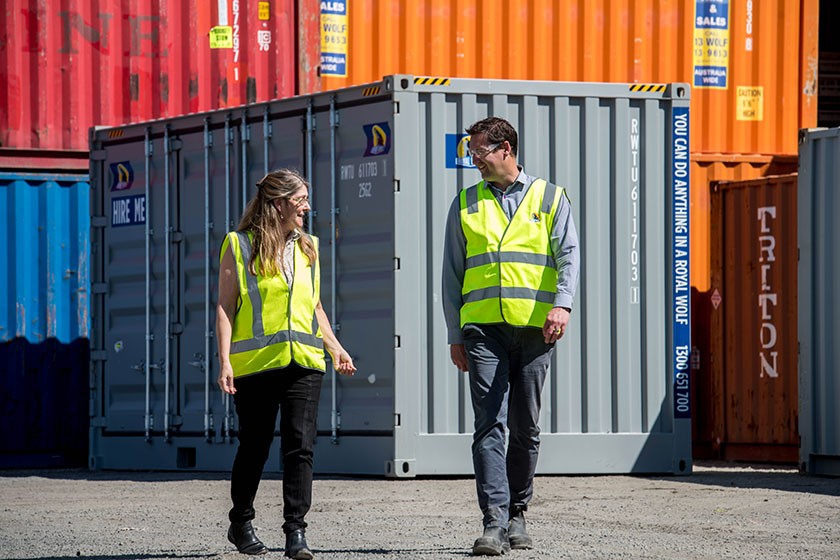
Bethlehem House CEO Stephanie Kirkman Meikle and Royal Wolf Business Development Manager (Tasmania) Michael Nicholson at the Royal Wolf depot in Tasmania. Photo: Alastair Bett
By Geoff Shearer
Tasmania has come up with an innovative way to put a roof over the heads of the state’s homeless. And it is more than happy to share its umbrella of ideas on the housing crisis with the rest of Australia.
To address an urgent need for more emergency and short-term accommodation options for homeless people, the Tasmanian Government began working with Royal Wolf more than six months ago to provide a number of repurposed shipping containers for both a men’s and a women’s shelter group. Now, in the midst of the COVID-19 pandemic, that forward thinking is even more important.
Minister for Housing and Human Services Roger Jaensch says there are lessons for the rest of Australia in the way Tasmania is handling the housing crisis. But it is not as simple as just copying the state’s lead.
"We also recognised that the response needs to be nuanced and adaptable due to the complex nature of the issue. Our message to others is to listen and don’t be afraid to try new things," Mr Jaensch says.
"The housing market is one that is constantly evolving and we need to be agile enough to rapidly respond to change and challenge."
The shipping container initiative includes the supply of 18 container pods for Hobart-based homeless accommodation service for men, Bethlehem House; and 17 larger containers for use by the Hobart Women’s Shelter (10 supplied by Royal Wolf) as crisis accommodation for women and children affected by domestic violence.
The initiative definitely has national, even international scope. And Royal Wolf says it’s willing and ready to assist other governments if they want to go down that path.
Royal Wolf CEO Neil Littlewood says they are “able to work in consultation with federal, state or local government to produce a cost-effective solution” for individual communities.
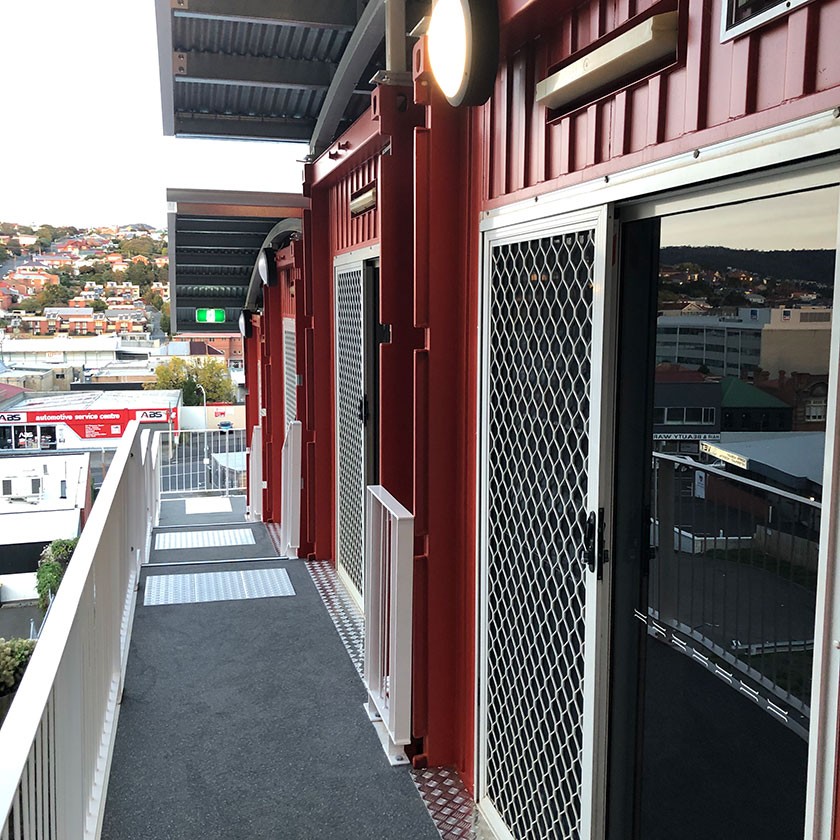
The men’s pods were installed at Bethlehem House in April, 2020. Photo: Royal Wolf
"Royal Wolf is setting the standard in providing portable, tailored shipping container solutions, not only for crisis accommodation projects, but also mining and infrastructure accommodation," he says.
"It is an uplifting feeling for the team to be involved in such a worthy cause. Every piece of assistance will make a difference to the welfare of those less fortunate."
Stephanie Kirkman Meikle is at the coalface of the homelessness crisis. The Chief Executive Officer at Bethlehem House says the “pod” initiative came about in response to community concern about the rising levels of homelessness and its increasing visibility.
"Tasmania is the most unaffordable state in which to rent a house in all of Australia," Mrs Kirkman Meikle says.
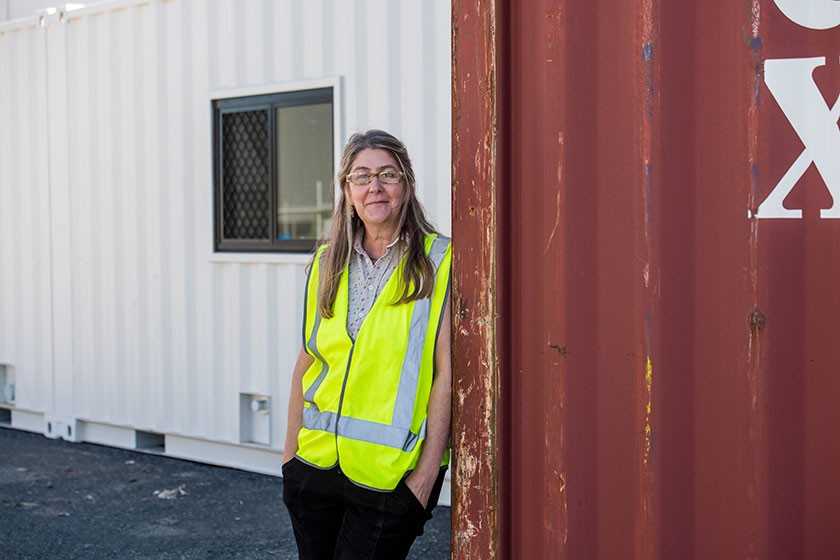
Bethlehem House CEO Stephanie Kirkman Meikle says the gap between average household income and rental affordability has been widening in Tasmania. Photo: Alastair Bett
The 2019 Rental Affordability Index (RAI) report, released in November, confirms that Hobart is continuing a trend as the nation’s least affordable city.
"Rental affordability in Hobart has dropped considerably over recent quarters and it is now the only capital city in Australia where rental affordability for the average income household has dropped below the critical threshold of 100 to a RAI score of 93 in June 2019," according to the report.
"This means that the average income household is now paying 30% of their income or more on rent. Although household incomes in Tasmania are significantly lower than the national average, rents are only marginally lower than mainland averages. The gap between income and rent has been widening over the past three years."
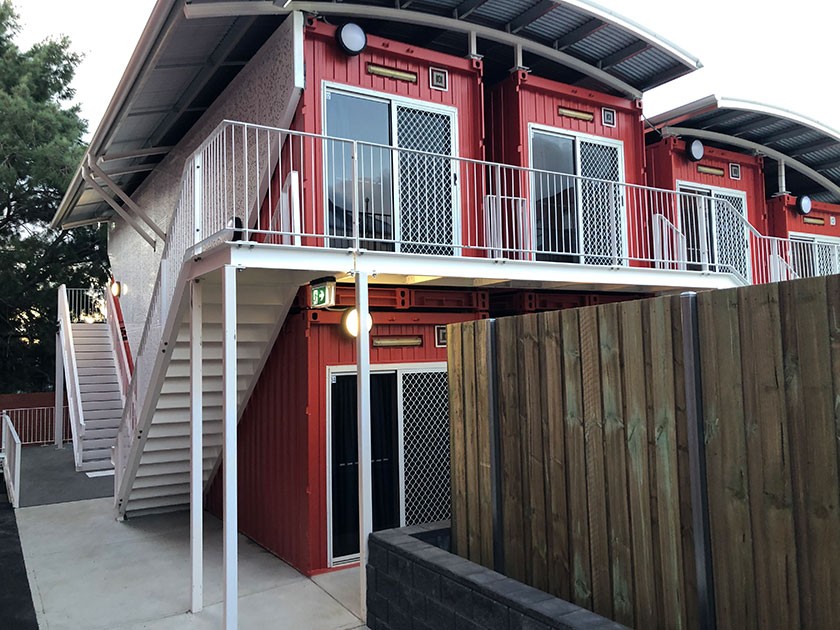
Residents moved into the 18 pods at Bethlehem House in April, 2020. Photo: Royal Wolf
Mrs Kirkman Meikle identifies several factors behind the crisis.
"It is partly because Tasmania has become a destination for tourism. It is also partly because of a large number of students who are attending university here. A construction boom that is happening in tourism also takes up bed spaces. And also because there haven’t been as many homes as people have needed," she says.
The Specialist Homelessness Service (SHS) annual report 2018-19 by the Australian Institute of Health and Welfare found that one in 80 people in Tasmania received homeless assistance during the year, higher than the national rate of one in 86.
It also showed that the top reason for clients seeking help was the housing crisis – with 54% of clients in Tasmania citing it as the main factor, compared to a national figure of 37%. The next main reasons were financial difficulties (45% in Tasmania, 41% nationally) and housing affordability stress (43% Tasmania, 28% nationally).
"The Tasmanian Government is doing a lot to address that, and there’s a flurry of house building," says Mrs Kirkman Meikle.
"There is a huge need. People in Tasmania are living below the poverty line. They are couch-surfing; a whole family might stay with someone else who could loosely be called friends, or extended family relatives; people are also living in their cars. And the problem has become visible – very visible – and of course the community doesn’t like that. They responded by wanting something done about it.
"So this fabulous initiative has come along, whereby Bethlehem House is going to increase its capacity. It’s hugely important to us because our purpose is to take people where they are now, whatever their problems, and to work out a map for how we can assist them, and how we can help them overcome the barriers that made them homeless in the first place. Now we can do this for more people. And we feel we can do it better. So we’re delighted to be part of it."
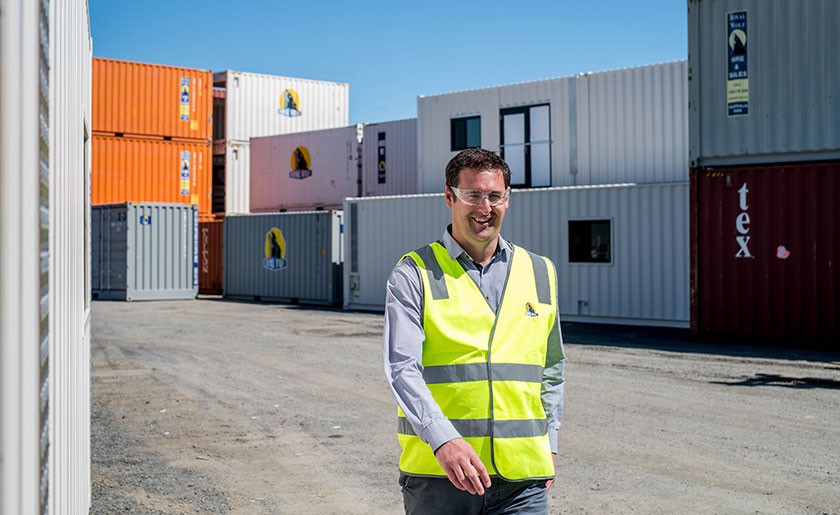
Royal Wolf Business Development Manager (Tasmania) Michael Nicholson has managed the project with the Tasmanian Government, Bethlehem House and Hobart Women’s Shelter. Photo: Alastair Bett
Mr Jaensch says everyone involved in the container project should be proud of their work, especially by the speed of the response.
"Bethlehem House is a great example of providing a significant increase in capacity in a short space of time. This showcases the enormous amount of skill and goodwill that has been directed towards the project," he says.
"Public servants, local government staff, service providers and private construction companies have all come together to plan and execute a solution that will provide individuals with safe, secure accommodation when they most need it.
"I hope that everyone involved in the project takes a sense of pride in what has been achieved here."